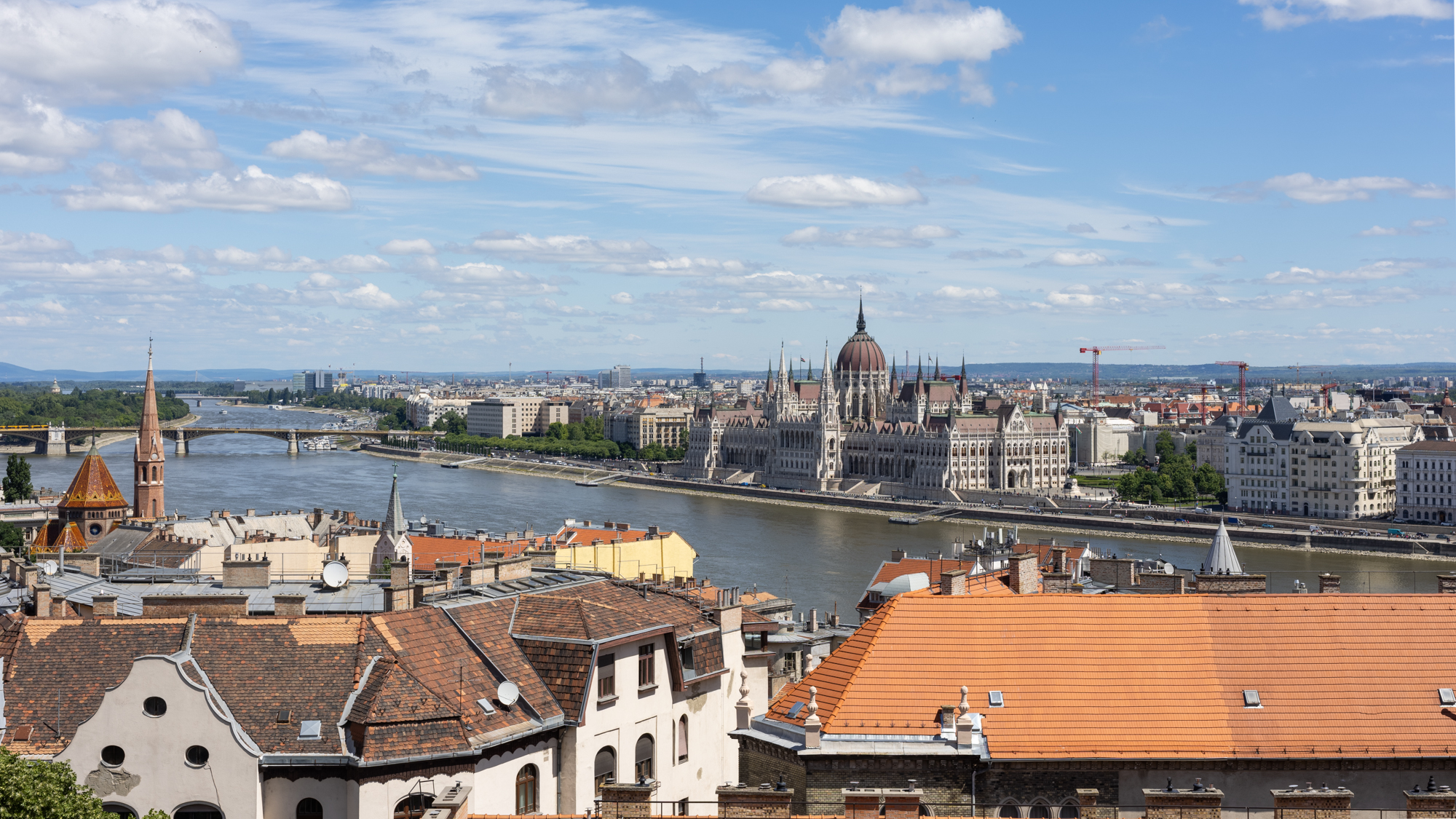I spent last weekend in Budapest—without ever leaving my couch. I binged the first season of FBI: International, Dick Wolf’s latest spin-off, and from the very first frames I was home again. The Chain Bridge shimmered in the dusk, the yellow number 2 tram clattered along the Danube past the floodlit Parliament, and steam curled off the Széchenyi baths exactly the way it used to on crisp winter mornings. Every small, perfect detail felt like a postcard slipped under my door—because that city really had been home from 2021 to 2024, my tiny flat squeezed downtown between the river on one side and the long Váci Street promenade on the other.
Then the Dick Wolf formula kicked in. And it became clear that Budapest was not only a beautiful setting, but a series villain.
Now, I’ve seen enough of his crime dramas to know his formula: the 42-minute template that always starts with a bang—literally—then marches through the same reliable beats. Cold open on a spectacular crime, assemble the team, briefing, legwork, action, mid-episode twist, bureaucratic hurdle, final takedown, quiet tag scene. Almost zero serialization so episodes can air in any order, forever. It’s precision-engineered for syndication, and now for endless streaming clicks: high stakes, heroic closure, just enough personal drama to humanize the agents, and the lightest dusting of moral ambiguity. Predictable, comforting, unstoppable.
Wolf has always bragged that his stories are ‘ripped from the headlines’, so I figured I was in safe hands. Instead, I watched Budapest quietly repurposed into seedy crime scenery. The city’s beauty is still visible, sure—but Hungary itself keeps getting cast as Europe’s corrupt, chaotic backyard: bent officials, Russian agents around every corner, oligarchs, traffickers, and far-right militias running wild.
Meanwhile, the real international crimes tearing at Europe right now—the wave of stabbings, gang rapes, and organized migrant crime that has overwhelmed cities from Cologne to Malmö to Paris—get completely sidelined. Those stories are too politically radioactive, too counter-narrative for a 42-minute American procedural. So the show points eastward instead, hands the Fly Team a villain it can neatly arrest, and leaves the continent’s most pressing crimes untouched, all while conveniently lying to the audience.
Take Season 1, Episode 8, ‘Voice of the People’, as just one example. A fictional far-right group, ‘Hungary for Hungarians’, bombs factories to fight ‘globalization stealing jobs’. A radicalized professor quotes Prime Minister Orbán verbatim. A laid-off worker plants the device. Pure invention. In my three years living there I never heard an explosion, never saw a torch-lit march turn violent—because Hungary has recorded almost no migrant-related crime, no notable hate crimes, and zero terrorist attacks in the modern era. Budapest, with 1.8 million people, remains one of Europe’s safest capitals—safer than Paris, London, Berlin, Brussels, Marseille, or Stockholm. If extremists operate there, they’re remarkably incompetent.
‘[Hungary] is safe, staggeringly beautiful, and cheap to film…More importantly, it’s an easy villain’
So why pick on Hungary? Simple. It’s safe, staggeringly beautiful, and cheap to film—cheaper than Paris with the same 19th-century skyline. More importantly, it’s an easy villain. For years Western media and Brussels elites have painted the country as a failing, semi-authoritarian backwater. FBI: International doesn’t challenge that caricature; it cashes in on it, adding fake explosions for drama.
Meanwhile, the real headlines—drawn straight from Europol reports, national police statistics, and court dockets—never make the case board. Europe’s most pressing transnational crimes over the past five years have overwhelmingly involved patterns of sexual violence and terrorism tied to mass migration in Western Europe. Those real ‘ripped from the headlines’ stories practically write themselves. The show just refuses to tell them.
Start with Sweden. In Malmö—whose population is now nearly half foreign-born—migrant-heavy ‘no-go zone’ neighborhoods like Rosengård have become synonymous with gang shootings and grenade attacks. Ethnic clans turned the city into a war zone; in January 2025 alone, more than 30 explosions rocked Stockholm. Prime Minister Ulf Kristersson admitted the government had ‘lost control’.
In the UK, grooming gangs—mostly Pakistani Muslim men preying on vulnerable white girls—are now making headlines after years, and perhaps decades, of a national coverup. In 2024, 11 more were convicted in Rotherham. In October 2025, seven men in Rochdale got 174 years combined for raping two teens. A national inquiry reopened over 800 old cases after a damning audit confirmed the pattern.
In France—the poster child for successful multiculturalism—77 per cent of street rapes in Paris from 2021 to 2023 were committed by foreign nationals, according to official police data. Elderly women, arguably the most vulnerable demographic, have become frequent targets of sexual assault, overwhelmingly at the hands of North African migrants. Meanwhile, a Lancet study found that asylum-seeking women themselves face an 18-times higher risk of rape after arrival in Europe—and, let’s be honest, the perpetrators aren’t named Jacques or Pierre.
Germany—Europe’s economic powerhouse and de facto leader—has hardly been spared. In Frankfurt, every single serious sexual assault reported in 2024 was committed by a foreign national. Every. Single. One. Across the country, asylum seekers—who make up barely 4 per cent of the population—commit almost 20 per cent of the nation’s violent crimes. Foreign nationals account for over 41 per cent of all suspects and nearly half of all gang-rape suspects, with almost two gang rapes occurring every day, year upon year. The pattern is unmistakable.
And that’s just the sexual crimes. Now consider the terrorist-style bombings ripping through these same Western European hotspots. Sweden alone has endured over 300 detonations since the start of 2023. Last January, they logged nearly one per day, most of which were tied to turf wars among migrant-led gangs in which members attempted to extort the government. Yet authorities and the media have spent years soft-pedaling the immigrant connections, with senior officials openly admitting a reluctance to ‘be frank about what’s going on’ —even as the blasts demolish the country’s once-peaceful image.
France has not been immune to migrant terrorism. In 2023 alone, they foiled multiple jihadist mass-casualty plots and made 78 terrorism arrests in 2023. Nonetheless, these threats are routinely framed as isolated incidents rather than symptoms of utter immigration integration failures.
Across the channel, the same pattern plays out with similarly dismal results. Over the last two years the UK has faced a steady drumbeat of Islamist terror plots and attacks—knifings, car-ramming schemes, subway stabbings, and foiled bombings—disproportionately linked to recent migrants and asylum seekers arriving by small boat from jihadist strongholds. These cases devour 75 per cent of MI5’s workload, drive the majority of live investigations, and fill nearly two-thirds of Britain’s terrorism prison wing, even as Europol celebrates a continent-wide drop to just 58 incidents in 2024 and the dinghies keep landing 36,000+ illegal entries a year from the same high-risk regions. The result? The political class mutters about ‘smashing the gangs’, and the public is once again told they are racist for noticing.
Contrast that with Hungary—a country the Western press wants us to believe is backsliding on democracy, ruled by a dictator and teetering on near-fascism. In reality, migrant-related crime is virtually non-existent, terror bombings there stand at exactly zero in the modern era, and far-right militia unrest or violent street marches simply do not happen. Hungary has achieved this calm by erecting a border wall in 2015, rejecting mass immigration, and maintaining some of Europe’s strictest entry policies. The result? A nation whisper quiet on both the migrant sexual-assault and terrorism fronts. Yet to hear the Western media tell it, Hungary doesn’t have reality—but racist fearmongering—on its side.
And that brings us back to FBI: International. Series bosses want you to gouge out your lying eyes and instead believe a well-worn trope: the real danger in Europe today lies in the east and Budapest, specifically. The show serves human-trafficking rings with migrants as victims only, never perpetrators. It invents cartoonish far-right cults. In four seasons, exactly zero episodes have highlighted radicalized immigrants, no-go zones, or the 2015 migrant crisis that sparked Western Europe’s current crime and terror surge.
‘The show misleads via sins of commission and omission. It plants migrant sex and terror crimes in a country that actually doesn’t have it’
To put it another way: the show misleads via sins of commission and omission. It plants migrant sex and terror crimes in a country that actually doesn’t have it. Then it ignores the places where those happen in spades—France, Germany, Belgium, the UK, Sweden, et al—because of who the perpetrators are. And due to their pathological, knee-jerk hatred of Hungary. Unassimilated migrants? Ignored or protected. Fictional Hungarian extremists? Unjustly demonized.
Liberal critics would, of course, roll their eyes at my assessment. They’ve long accused Wolf’s shows of being pro-police and even quietly conservative, especially during the height of the Woke Era. All the while, Wolf continues to insist on neutrality in his storytelling. Yet with FBI: International, the pattern tells a very different story: invented threats that paint chaos where real life is calm, and near-total silence where the dangers actually rage. Sins of omission and commission.
I get it—to a point. CBS is chasing views, clicks, and ad dollars. The show is fiction, pure entertainment. The real story of Europe’s migrant-crime wave would never fly with an audience that’s been told for decades that Western Europe’s multiculturalism is a triumphant success and East-Central Europe’s nation-state model—Hungary’s in particular—is the dangerous failure. So it’s far safer to invent cartoon ‘Hungary for Hungarians’ neo-Nazis, the kind of villain an Oklahoma City bomber would nod along to, than to touch the live wire of decades of failed, left-liberal open-borders dogma and its very real predations.
Truth, as they say, is always stranger—and far more compelling—than fiction. If only CBS had trusted its audience to handle it.
Thankfully, the network axed the show earlier this year after four seasons, citing budget cuts. That means we’ll be spared any further sins, whether of commission or omission when it comes to Europe’s most pressing international crimes.
The damage is done. Most viewers will swallow the caricature without a second thought, file ‘Hungary = corrupt chaos’ into their mental map of Europe, and never realize they’ve been fed quiet propaganda dressed as entertainment. Beautiful Budapest didn’t deserve the smear. And the audience didn’t deserve the lie.
Related articles:







